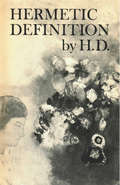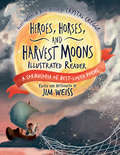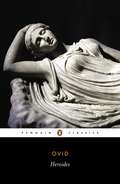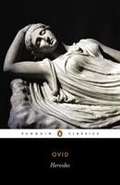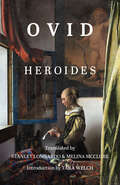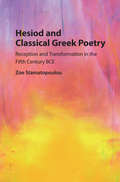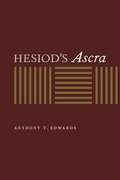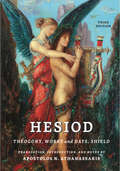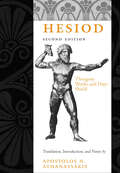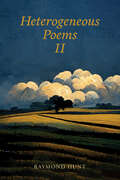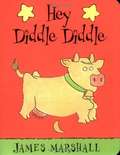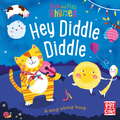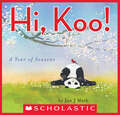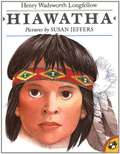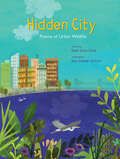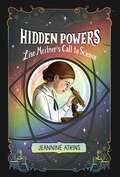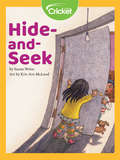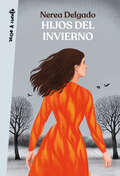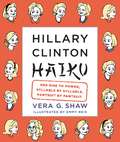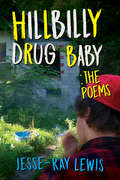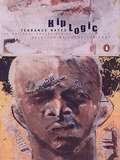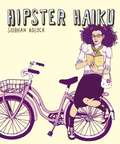- Table View
- List View
Hermetic Definition: Poetry
by Hilda DoolittleThis late collection, written in the last years of H.D.'s life, is a testament to the fine ear and mythic sense of a poet who is now recognized as one of the greatest of her generation. H. D.'s (Hilda Doolittle, 1884-1961) late poems of search and longing represent the mature achievement of a poet who has come increasingly to be recognized as one of the most important of her generation. The title poem and other long pieces in this collection ("Sagesse" and "Winter Love") were written between 1957 and her death four years later, and are heretofore unpublished, except in fragments. We can see now in proper context her fine ear for the free line, and understand why other poets, such as Denise Levertov, Robert Creeley, and Robert Duncan, find so much to admire in H. D.'s work. As in her earlier books, one level of H.D.'s significant poetic statement derives from her intimate knowledge of and identification with classical Greek and arcane cultures; taken together, these elements make up the poet's own personal myth. Norman Holmes Pearson, H. D's friend and literary executor, has contributed an illuminating foreword to this impressive collection. H. D.'s (Hilda Doolittle, 1884-1961) late poems of search and longing represent the mature achievement of a poet who has come increasingly to be recognized as one of the most important of her generation. The title poem and other long pieces in this collection ("Sagesse" and "Winter Love") were written between 1957 and her death four years later, and are heretofore unpublished, except in fragments. We can see now in proper context her fine ear for the free line, and understand why other poets, such as Denise Levertov, Robert Creeley, and Robert Duncan, find so much to admire in H. D.'s work. As in her earlier books, one level of H.D.'s significant poetic statement derives from her intimate knowledge of and identification with classical Greek and arcane cultures; taken together, these elements make up the poet's own personal myth. Norman Holmes Pearson, H. D's friend and literary executor, has contributed an illuminating foreword to this impressive collection.
Heroes, Horses, and Harvest Moons Illustrated Reader: A Cornucopia Of Best-loved Poems (A Cornucopia of Best-Loved Poems #0)
by Jim Weiss Crystal CreggeClassic poems about nature, bravery, love, and the wild journeys of the imagination, beautifully illustrated by Crystal Cregge.
Heroides
by OvidIn the twenty-one poems of the Heroides, Ovid gave voice to the heroines and heroes of epic and myth. These deeply moving literary epistles reveal the happiness and torment of love, as the writers tell of their pain at separation, forgiveness of infidelity or anger at betrayal. The faithful Penelope wonders at the suspiciously long absence of Ulysses, while Dido bitterly reproaches Aeneas for too eagerly leaving her bed to follow his destiny, and Sappho - the only historical figure portrayed here - describes her passion for the cruelly rejecting Phaon. In the poetic letters between Paris and Helen the lovers seem oblivious to the tragedy prophesied for them, while in another exchange the youthful Leander asserts his foolhardy eagerness to risk his life to be with his beloved Hero.
Heroides
by Publius Ovidius NasoIn the twenty-one poems of the Heroides, Ovid gave voice to the heroines and heroes of epic and myth. These deeply moving literary epistles reveal the happiness and torment of love, as the writers tell of their pain at separation, forgiveness of infidelity or anger at betrayal. The faithful Penelope wonders at the suspiciously long absence of Ulysses, while Dido bitterly reproaches Aeneas for too eagerly leaving her bed to follow his destiny, and Sappho - the only historical figure portrayed here - describes her passion for the cruelly rejecting Phaon. In the poetic letters between Paris and Helen the lovers seem oblivious to the tragedy prophesied for them, while in another exchange the youthful Leander asserts his foolhardy eagerness to risk his life to be with his beloved Hero.
Heroides (Hackett Classics)
by Ovid"What would Greek and Roman myth look like if women had written the stories?" asks Tara Welch in her illuminating Introduction to this volume. Stanley Lombardo and Melina McClure&’s faithful translation of Ovid&’s famous letters, purportedly written by heroines of classical antiquity to their absent lovers, offers an inkling of one intriguing possibility.
Heroism in the New Black Poetry: Introductions and Interviews
by D. H. MelhemThe six poets studied here--Amiri Baraka, Gwendolyn Brooks, Jayne Cortez, Haki R. Madhubuti, Dudley Randall, and Sonia Sanchez--offer frank analyses of the tensions and preoccupations that have shaped their attitudes toward art, race, community, sexuality, politics, religion.
Hesiod and Classical Greek Poetry: Reception and Transformation in the Fifth Century BCE
by Zoe StamatopoulouHesiod was regarded by the Greeks as a foundational figure of their culture, alongside Homer. This book examines the rich and varied engagement of fifth-century lyric and drama with the poetic corpus attributed to Hesiod as well as with the poetic figure of Hesiod. The first half of the book is dedicated to Hesiodic reception in Pindaric and Bacchylidean poetry, with a particular focus on poetics, genealogies and mythological narratives, and didactic voices. The second half examines how Hesiodic narratives are approached and appropriated in tragedy and satyr drama, especially in the Prometheus plays and in Euripides' Ion. It also explores the multifaceted engagement of Old Comedy with the poetry and authority associated with Hesiod. Through close readings of numerous case studies, the book surveys the complex landscape of Hesiodic reception in the fifth century BCE, focusing primarily on lyric and dramatic responses to the Hesiodic tradition.
Hesiod's Ascra
by Anthony T. EdwardsAnthony T. Edwards extracts from Hesiod's poem "Works and Days" a picture of the social structure of Ascra, the hamlet in northern Greece where Hesiod lived, most likely during the seventh century B.C.E.
Hesiod: Theogony, Works and Days, Shield
by Apostolos N. AthanassakisThis best-selling translation of Hesiod's the Theogony, the Works and Days, and the Shield has been updated into the most indispensable edition yet for students of Greek mythology and literature.Next to the works of Homer, Hesiod's poems are foundational texts for students of the classics. His two major surviving works, the Theogony and the Works and Days, address the divine and the mundane, respectively. The Theogony traces the origins of the Greek gods and recounts the events surrounding the crowning of Zeus as their king, while the Works and Days is a manual of moral instruction in verse addressed to farmers and peasants. Though modern scholars dispute the authorship of the Shield, ancient texts treat this final poem about the shield of Herakles as unquestionably Hesiodic.Introducing his celebrated translations of Hesiod, Apostolos N. Athanassakis positions the philosopher-poet as heir to a long tradition of Hellenic poetry. Hesiod's poems demonstrate the author's passionate interest in the governance of human society through justice and a tangible work ethic. As a physicist and a materialist, Hesiod avoided such subjects as honor and the afterlife. His works contain the oldest fundamentals on law and Greek economy, making Hesiod the first great thinker of Western civilization. Athanassakis's contextual notes offer both comparison to Biblical and Norse mythologies as well as anthropological connections to modern Greece.The third edition of this classic undergraduate text includes a thoroughly updated bibliography reflecting the last two decades of scholarship. The introductions and notes have been enriched, clarifying contextual history and the meaning of Hesiod's own language and themes, and notes have been newly added to the Shield. Athanassakis has lightly improved his translation throughout the text, expertly balancing the natural flow of the verse while adhering closely to the literal Greek.
Hesiod: Theogony, Works and Days, Shield
by HesiodHesiod belongs to the transitional period in Greek civilization between the oral tradition and the introduction of a written alphabet. His two major surviving works, the Theogony and the Works and Days, address the divine and the mundane, respectively. The Theogony traces the origins of the Greek gods and recounts the events surrounding the crowning of Zeus as their king. A manual of moral instruction in verse, the Works and Days was addressed to farmers and peasants.Introducing his celebrated translations of these two poems and of the Shield, a very ancient poem of disputed authorship, Apostolos Athanassakis positions Hesiod simultaneously as a philosopher-poet, a bard with deep roots in the culture of his native Boeotia, and the heir to a long tradition of Hellenic poetry. For this eagerly anticipated revised edition, Athanassakis has provided an expanded introduction on Hesiod and his work, subtly amended his faithful translations, significantly augmented the notes and index, and updated the bibliography. Already a classic, Hesiod: Theogony, Works and Days, Shield is now more valuable than ever for students of Greek mythology and literature.
Heterogeneous Poems 2
by Raymond HuntThis second volume of Raymond Hunt’s Heterogeneous Poems gives us poetic postcards celebrating the many parts of the world he has visited over the decades, from the Andes mountains of South America to the Great Wall of China, alongside evocative snapshots of Raymond’s beloved English countryside. Once you delve into this delightful assortment of verse, you will be sure to find something to make you smile, or think – or maybe a bit of both.
Hey Diddle Diddle
by James MarshallThe cat, the ffiddle, the moon are all here in the classic Hey Diddle Diddle nursery rhyme, but with a twist at the end, other events unfold and characters are added. Other books by this author are available in this library.
Hey Diddle Diddle: A baby sing-along book (Peek and Play Rhymes #3)
by Pat-a-CakeHey Diddle Diddle combines lively pictures with a classic rhyme that's easy for parents and carers to recognise and recite. Young children will adore singing along as they recognise all the friendly characters in this timeless rhyme. The spotting game at the end is a great incentive to go through the pages once again until each tiny thing is found! Nursery Rhymes are important stepping stones to language development. The rhymes usually tell a story, too, with a beginning, a middle and an end. This teaches children that events happen in sequence, and they begin to follow along. Nursery rhymes are also full of repetition making them easy to remember, and often become some of a child's first sentences. Also available: The Wheels on the Bus, Twinkle Twinkle Little Star, Old Macdonald had a Farm
Hey World, Here I Am!
by Jean LittleA collection of poems and brief vignettes from the perspective of a girl named Kate Bloomfield, reflecting her views on friendship, school, family life, and the world.
Hi, Koo!: A Year of Seasons (A Stillwater and Friends Book)
by Jon J MuthStillwater, the beloved Zen panda, now in his own Apple TV+ original series!Caldecott Honoree and New York Times bestselling author/artist Jon J Muth takes a fresh and exciting new look at the four seasons!Eating warm cookies on a cold day is easy water catchesevery thrown stone skip skip splash With a featherlight touch and disarming charm, Jon J Muth--and his delightful little panda bear, Koo--challenge readers to stretch their minds and imaginations with twenty-six haikus about the four seasons.
Hiawatha
by Henry Wadsworth Longfellow Susan JeffersThe classic American poem The Song of Hiawatha is developed into a tale covering the childhood of Hiawatha and telling the story of his early years, when he first learned the Native American way of life from his grandmother.
Hidden City: Poems of Urban Wildlife
by Sarah` Grace TuttleA poetic book highlighting everyday natureThe perfect blend of science and poetry, Hidden City demonstrates that nature can thrive anywhere, even in highly populated areas. In this graceful collection of poems, skyscrapers serve as perches for falcons, streetlights attract an insect buffet for hungry bats, and an overgrown urban lot offers shelter to both flora and fauna. Hidden City also includes engageing supplementary materials, which provide scientific information about the animals and plants featured in the book.Coupled with beautiful collage illustrations, the poems in Hidden City offer readers the perfect reminder to notice and care about their environment.
Hidden Powers: Lise Meitner's Call to Science
by Jeannine AtkinsFrom the acclaimed author of Finding Wonders and Grasping Mysteries comes a gorgeously written biography in verse about the pioneering Jewish woman physicist whose scientific prowess changed the course of World War II. At the turn of the 20th century, Lise Meitner dreamed of becoming a scientist. In her time, girls were not supposed to want careers, much less ones in science. But Lise was smart—and determined. She earned a PhD in physics, then became the first woman physics professor at the University of Berlin. The work was thrilling, but Nazi Germany was a dangerous place for a Jewish woman. When the risks grew too great, Lise escaped to Sweden, where she continued the experiments that she and her laboratory partner had worked on for years. Her efforts led to the discovery of nuclear fission and altered the course of history. Only Lise&’s partner, a man, received the Nobel Prize for their findings, but this moving and accessible biography shows how Lise&’s legacy endures.
Hide-and-Seek
by Susan WeissLet's play a game of hide-and-seek. I'll hide first, and don't you peek!
Hijos del invierno
by Nerea DelgadoNerea Delgado ahonda en estas páginas en el vértigo del amor y la nostalgia, en el bello peligro de empezar de nuevo «solos o en compañía» a pesar del miedo y del pasado, que nos ponen en alerta pero no nos frenan. «Le quitaremos el frío a la definición de invierno. Arderá diciembre y lo veré en tus ojos». Somos hijos del invierno, nacimos del frío de nuestro pasado, de los copos de dolor y angustia que nos han llovido. Hemos renacido en este amor sorpresa, en este amor misterio que nos dice al oído «atrévete», que nos promete a la vez, de nuevo, la placidez del bosque y de la hoguera, la ambición del cerezo en flor.
Hillary Clinton Haiku: All Things Hillary In Zen-like Bites
by Vera G. ShawThe poetic form of the haiku is pretty old, widely known, and occasionally kinda funny. In these ways it resembles Hillary Rodham Clinton. And, let's face it. Everyone knows Americans hate to read. Enter: HILLARY CLINTON HAIKU, which distills the essential details of HRC into seventeen syllables where thousands of articles and biographies fall short--or, rather, long. HILLARY CLINTON HAIKU will not only help you and your fellow Americans make the right, informed decision at the polls--whatever that may be--it will also help make the vast contemporary machine of politics, glass ceilings, and scandal a little easier to swallow. Here's a taste: First Lady Of The United States Preceded by Barb Bush; succeeded by Laura. Much 2 much Texas. Double Standard Hillary "Which designers do I prefer? Would you ask a man that question?
Hillbilly Drug Baby: The Poems (Hillbilly Drug Baby Ser. #1)
by Jesse-Ray LewisWhen they went to my fatherto see if he wanted to raise his twelve-year-old son he couldn’t pass the simple test of not having needles strewn all over the floor.The words are sometimes harsh and the visualizations raw, but so is reality for Jesse-Ray Lewis. He grew up in Appalachia surrounded by violence, drug dealing, and addiction.I held her for hours.There was foam at her mouth and blood as I cradled her.I am the one who closed her eyes.He entered foster care at age 12 and aged out of the system in 2016 at age 18. I thought, I want that.I want to live without walking from nowhere to nowhere.His poems rise up out of that shattered childhood as a quest for answers and a search for a new beginning. Hillbilly drug baby? Maybe that’s who I came out as. But it’s not who I want to be. In these poems, you see a young man on a precipice, wooed by drugs and forgetfulness, but longing for something bigger and better. I find a single droplet of hope and choke on it." Unafraid, he probes our deepest fears---what would it be like to live that life? To plumb the depths of hell?" - Saundra Kelley, author of Southern Appalachian Storytellers
Hindi ke Prachin Pratinidhi Kavi: हिन्दी के प्राचीन प्रतिनिधि कवि
by Dr Nagendra“हिन्दी के प्राचीन प्रतिनिधि कवि” प्रस्तुत ग्रन्थ में हिन्दी के प्राचीन काव्य की विविध धाराओं के प्रवर्तक एवं प्रतिनिधि कवियों का अध्ययन एवं अनुशीलन उपस्थित किया गया है, जो हिन्दी-साहित्य के जिज्ञासु-प्रेमियों के साथ-साथ बी. ए. तथा एम. ए. के हिन्दी छात्रों के लिए अत्यन्त उपयोगी है । इस अध्ययन के अन्तर्गत चेष्टा यह की गई है कि अध्येता को आरम्भ से लेकर रीतिकाल की रीति-बद्ध एवं रीति-मुक्त काव्य-धारा तक के सम्पूर्ण प्रतिनिधि कवियों तथा प्राचीन काव्य की विविध धाराओं का सम्यक ज्ञान प्राप्त हो जाय ।
Hip Logic
by Terrance HayesTerrance Hayes is a dazzlingly original poet, interested in adventurous explorations of subject and form. His new work, Hip Logic, is full of poetic tributes to the likes of Paul Robeson, Big Bird, Balthus, and Mr. T, as well as poems based on the anagram principle of words within a word. Throughout, Hayes's verse dances in a kind of homemade music box, with notes that range from tender to erudite, associative to narrative, humorous to political. Hip Logic does much to capture the nuances of contemporary male African American identity and confirms Hayes's reputation as one of the most compelling new voices in American poetry.
